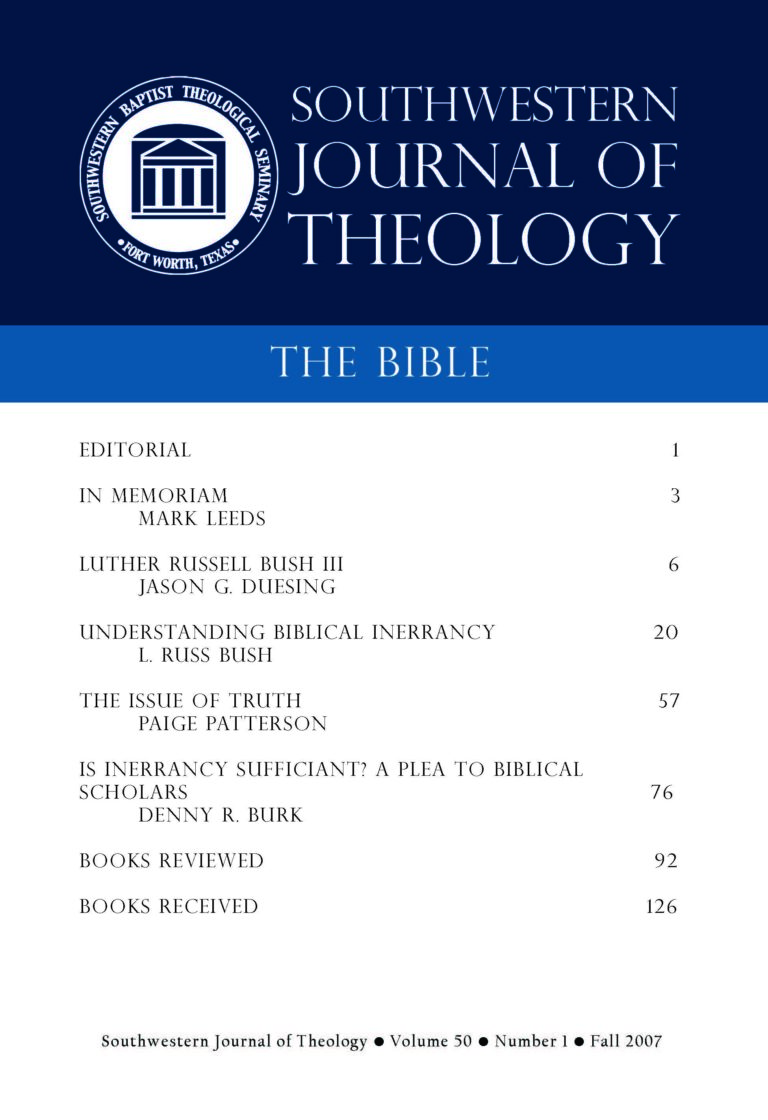
The Bible
Southwestern Journal of Theology
Volume 50, No. 1 – Fall 2007
Managing Editor: Malcolm B. Yarnell III
By Wayne Grudem. Colorado Springs: Multnomah, 2006. 284 pages. Paperback, $14.99.
The field of biblical manhood and womanhood is one in which Wayne Grudem’s voice is uniquely valuable. Among Grudem’s contributions to this area is the volume Countering the Claims of Evangelical Feminism. In the first section of the book Grudem lays out the classic complementarian position, which he titles “A Biblical Vision for Manhood and Womanhood.” Grudem does well to begin here as he lays the foundation for the remainder of the book in both content and methodological framework for responding to egalitarian arguments. These chapters are a foundation in content in that they contain Grudem’s summary of what the Bible says about the roles of men and women. These chapters also serve as the foundation for his methodology by modeling the complementarian hermeneutic which elevates the authority of Scripture over experience. This methodology crystallizes the fundamental difference between the egalitarian and complementarian positions. The key expression of Grudem’s position concerning women in the church comes in the following summary state- ment: “[When] there is an assembled group of Christians, women should not teach the Bible to men or exercise authority over men”(49).
In the remaining portion of the book Grudem aggressively addresses the many arguments set forth in favor of the egalitarian interpretation of Scripture. These arguments are organized in nine categories based upon the type of argument offered by egalitarians. Finally the book concludes with Grudem’s vision for biblical manhood and womanhood in the future. Here Grudem calls for pastors and theologians to believe and teach complimentarianism.
Grudem’s treatment of feminism in the evangelical churches reveals the truths that should guide individuals’ thinking. His treatment displays a hermeneutical approach that submits to Scripture as final authority. A consequence of submitting to the authority of Scripture is the appropriately lower position of experience. The hermeneutical significance of Grudem’s work is likewise found in his exposure of the faulty interpretive priorities of egalitarianism. Through the process of refuting numerous arguments for egalitarian gender roles, Grudem demonstrates that these arguments are of an entirely different nature from complementarian arguments. The egalitarian arguments are constructed from priorities that elevate the authority of experience over the authority of Scripture (267). The clarification of this difference in interpretive approaches is the greatest strength of the book. This clarification paints egalitarianism as an evangelical feminism which in its true light dismisses biblical authority in order to embrace experiential authority.
While there are many strengths of this work there is a weakness that requires mention. Grudem devotes the vast majority of the work to biblical gender roles with reference to the church. This emphasis is critically important. However, this devotion is done at the cost of discussing in significant detail the issues pertinent to gender roles in the home. Grudem could have constructed his thesis and title in such a way to communicate that the purpose of the book was primarily to address the issue within the church. However, this specification is absent leaving the reader to expect a full treatment of the two areas of gender debate. An implication of this imbalance is that Grudem does not explicitly call pastors and theologians to be consistent complementarians. Rather, he provides a soft call for complementarianism without clarifying that the issue is as important in the home if not more so than in the church.
This volume possesses usefulness as a selective treatment of gender roles. Grudem has published several volumes that address the subject in much more detail. Those volumes serve well as references for an investigation of gender roles. This book stands in contrast as a condensed statement of the complementarian interpretation of Scripture. This feature positions the book as a useful tool for equipping church members with the knowledge necessary to navigate gender roles in contemporary culture. With such a tool in hand, theologians and pastors should not wince at the call provided by Grudem to teach proper gender roles. He appropriately notes that a decision to avoid taking a stance on the issue is in fact choosing a slide toward liberalism (282). The fact that the topic is currently controversial in Western culture does not mean that it is an issue which should be avoided for the sake of peace. Rather Christians are called to stand with courage in proclaiming the biblical gender roles despite pressures to the contrary (299).





